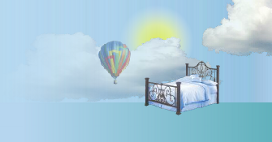| Category: | |
|---|---|
| Price per night: | To |
| Star rating: |
|
| Disabled facilities: | |
| Off-street parking: | |
| Wi-Fi in rooms: | |
| Dogs welcome: |
Visit Cockermouth and the surrounding villages and stay in bed & breakfast accommodation:
Cockermouth, Cumbria, can be used as a base for motoring tours into the Lake District. It is among the towns recommended by the Council for British Archaeology for preservation. This confluence of the Rivers Cocker and Derwent was a strategic point for the Romans, and stone from their fort at Papcastle was used in 1134 by Waltheof of Dunbar to build a castle. It was partly destroyed by Robert the Bruce, and after various other attacks and sieges was partly dismantled after the Civil War. The present ruins are said to be 13th- and 14th-century. Cockermouth was a busy market town in the 16th century, and the county's commercial centre by the mid-l7th. It was one of the oldest parliamentary boroughs in the country. The statue in the pleasant wide main street is of Earl Mayo, one of its Members of Parliament. In 1568 Mary Queen of Scots was received at Cockermouth Hall after her flight from the Battle of Langside via Workington.
Cockermouth was the birthplace of several famous people, including John Dalton, formulator of the atomic theory, and Fletcher Christian, leader of the mutiny on the Bounty. The house where Dalton was born is at Eaglesfield, 3 miles South West, and bears a commemorative plaque. Christian was born in 1764 at Moorland Close, a farmhouse near the southern boundary of the town beside the A5086.
But the great figures of Cockermouth, of course are the Wordsworths, and Wordsworth House is internationally known as one of the two principal residences of the poet to visit in the Lake District, the other being Dove Cottage at Grasmere. That at Cockermouth is on the north side of Main Street, near the west end, and was acquired by the National Trust in 1938 after a public appeal. It is a handsome house built in 1745 and became the home of William's father in 1766 when he was made steward to Sir James Lowther. William was born here in 1770, and Dorothy in 1771. It is a house with many windows, and the original staircase, fire-places and panelling are to be seen. A reception book holds the names of famous visitors from many parts of the world. William spent some time at a Penrith school, but when he was only eight, his mother died and he went to Hawkshead. In The Prelude he recalls the garden behind the house, and Dorothy mentions the house in her Journals.
The 19th-century Church of All Saints, South of the market place, has a memorial stained-glass window to Wordsworth, and his father's grave near the east end. He and Fletcher Christian also attended the grammar school, formerly on the site in the churchyard where the church rooms now stand. At Pardshaw the Society of Friends has one of its oldest meeting houses. George Fox preached at Pardshaw Crags in 1657 and 1663.
Nearby towns: Bassenthwaite, Caldbeck, Egremont, Keswick, Maryport, Whitehaven, Workington
Nearby villages: Allonby, Arlecdon, Aspatria, Baggrow, Boltongate, Borrowdale, Bothel, Branthwaite, Bridekirk, Brigham, Broughton Moor, Buttermere, Camerton, Cleator Moor, Crosscanonby, Dearham, Distington, Ellenborough, Flimby, Frizington, Gilcrux, Gilgarran, Ireby, Kirkland, Lamplugh, Langrigg, Lorton, Lowca, Loweswater, Mealsgate, Mockerkin, Mossbay, Newlands, Parkside, Plumbland, Red Dial, Rosthwaite, Rowrah, Siddick, Silloth, St Bees, Tallentire, Torpenhow, Uldale, Ullock, Westnewton, Westward, Whitehaven, Winder, Winscales
Have you decided to visit Cockermouth or the surrounding villages? Please look above for somewhere to stay in:
- a Cockermouth bed and breakfast (a Cockermouth B&B or Cockermouth b and b)
- a Cockermouth guesthouse
- a Cockermouth hotel (or motel)
- a Cockermouth self-catering establishment, or
- other Cockermouth accommodation
Accommodation in Cockermouth:
Find availability in a Cockermouth bed and breakfast, also known as B&B or b and b, guesthouse, small hotel, self-catering or other accommodation.

